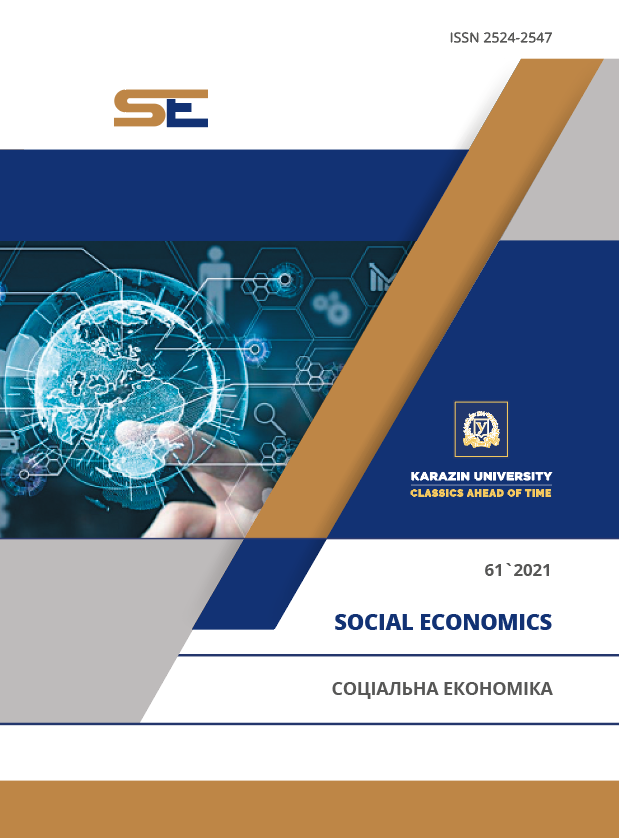INTERNATIONAL MIGRATION OF HIGHLY SKILLED WORKERS: THEORETICAL ASPECT AND IMPACT ON THE COUNTRY’S ECONOMIC GROWTH
Abstract
This scientific paper analyses the theoretical approaches of domestic and foreign scientists to determining the meaning of the concept named "migration of highly skilled workers", in other words highly skilled migration. The author determined the essence of related categories, among which one can often find the identification of international migration of highly skilled workers with intellectual migration. The scholar carried out the investigation of the relationship between the migration of highly skilled workers and economic growth basing on the case study of the member states of the European Union. In 2019, the average share of immigrants with higher education in the EU28 countries was 28.1% with a tendency to a steady increase in this indicator during the study period. In order to ensure a scientifically sound classification of European countries, as well as the identification of internal links between the units in the aggregate, the author conducted cluster analysis based on the use of three analytical indicators for 2019, namely: the share of immigrants with higher education, %; level of economic activity of immigrants with higher education, %; employment rate of immigrants with higher education, %. The comprehensive analysis of the migration of highly skilled workers within the study is supplemented by the analytical data on the permits issued by European countries for the employment of highly skilled workers. There was a significant difference in the number of first permits issued for paid activities for highly skilled workers in different EU member states. In 2019, the leaders in terms of the share of such permits in the total number of permits included the Netherlands (64.48%), Denmark (51.53%), and Liechtenstein (50.83%). Within the framework of the study, the basic indicator of the relationship between the issued employment permits for highly skilled migrants and the country’s economic growth is the gross national income per capita. In order to conduct a very thoughtful analysis, the author calculated the Pearson product-moment correlation coefficient basing on the case study of 13 European Union member states in 2019. The value of the pairwise correlation coefficient between the studied indicators is 0.9252, which confirms the significant impact of highly skilled immigration on the economic growth of the country.
Downloads
References
Poliarush, S. (2020). Intelektualna trudova mihratsiia i Ukraina [Intellectual labor migration and Ukraine]. Legal challenges of today: international migration in the context of globalization: Materials and International. scientific-practical online conf. (pp. 47-49). (in Ukrainian)
Cavallini, S., Soldi, R., Di Matteo, L., Utma, M. A., & Errico, B. (2018). Addressing brain drain: The local and regional dimension. European Union.
Smutchak, Z. V. (2018). Problema trudovoi mihratsii: pozytyvni i nehatyvni naslidky dlia ekonomiky. [The problem of labor migration: positive and negative consequences for the economy]. Economic Bulletin. Series: finance, accounting, taxation, 2, 192-198. (in Ukrainian)
Erfan, E. A. (2018). Osoblyvosti mizhnarodnoi mihratsii vysokokvalifikovanykh pratsivnykiv. [Features of international migration of highly qualified workers]. Scientific Bulletin of Uzhhorod National University, 18, 10-14. (in Ukrainian)
Horry, H., Jalaee, S. A., & Hamzenejad, N. (2015). The Impacts of Brain Drain on Production and Foreign Trade of Iran Usung a General Equilibrium Model. Quarterly Journal of Applied Theories of Economics, 2 (1), 24-44.
Ostrovsky, I. A., & Rybak, G. I. (2019). Osvitni aspekty mizhnarodnoi intelektualnoi mihratsii. [Educational aspects of international intellectual migration]. Scientific Bulletin of Uzhhorod National University: series: International Economic Relations and World Economy, 25, 42-45. (in Ukrainian)
Yang, X., & Zxang, H. (2017). Intellectual property rights, migrants and competitiveness. International Journal of Development Issues, 16, 43-53
Demidenko, O. I. (2018). Napriamky intelektualnoi mihratsii hromadian Ukrainy. [Directions of intellectual migration of citizens of Ukraine]. Bulletin of ONU named after II Mechnikov. Sociology and political science, 2(31), 180-189. (in Ukrainian)
Vlasova, T. R. (2015). Mizhnarodna intelektualna mihratsiia: naslidky dlia krain-donoriv. [International intellectual migration: implications for donor countries]. Demography, labor economics, social economy and politics, 60, 16-24. (in Ukrainian)
Levchuk, K. O. (2019). Intelektualna mihratsiia: problemy ta shliakhy vyrishennia. [Intellectual migration: problems and solutions]. Priazovsky Economic Bulletin, 1(12), 158-161.
Ostrovsky, I. A. (2019). Mizhnarodna intelektualna mihratsiia: svitovi trendy ta problemy Ukrainy. [International intellectual migration: global trends and problems of Ukraine]. Effective Economics, 5. doi: https://doi.org/10.32702/2307-2105-2019.5.59. (in Ukrainian)
Davidyuk, L. P. (2019). Intelektualna mihratsiia trudovykh resursiv v umovakh hlobalizatsii. [Intellectual migration of labor resources in the context of globalization]. Effective Economics, 11. doi: https://doi.org/10.32702/2307-2105-2019.11.69. (in Ukrainian)
Malinovskaya, O. A. (2018). Mihratsiina polityka: hlobalnyi kontekst ta ukrainski realii. [Migration policy: global context and Ukrainian realities]. Monograph. NISS. (in Ukrainian)
Sankpal, S. V., Kasturi Rohit Naik, K. R. (2015). Brain Drain/Brain Gain: Socio Economic Effect on Indian Society. International Journal of Management and Humanities, 1(1), 5-6.
Kone, Z. L., & Özden, Ç. (2017). Brain Drain, Gain, and Circulation Centre on Migration, Policy and Society (COMPAS). University of Oxford and Çağlar Özden is Lead Economist, Development Research Group, World Bank.
Schiff, M. W. (2018). Brain Drain-Induced Brain Gain and the Bhagwati Tax: Are Early and Recent Paradigms Compatible? IZA Discussion Paper, 11551. Retrieved from https://ssrn.com/abstract=3193305.
Vlasova, T. R. (2020). Mizhnarodna intelektualna mihratsiia: vid «vidplyvu umiv» do yikh tsyrkuliatsii. [International intellectual migration: from the "brain drain" to their circulation]. Demography, labor economics, social economy and politics, I-II(77-78), 315-325. (in Ukrainian)
Șerban, A. C., Aceleanu, M. I., Dospinescu, A. S., Țîrcă, D.-M., & Novo-Corti, I. (2020). The impact of EU immigration on economic growth through the skill composition channel. Technological and Economic Development of Economy, 26(2), 479-503. doi: https://doi.org/10.3846/tede.2020.11954.
Caviggioli, F., Jensen, P., & Scellato, G. (2020). Highly skilled migrants and technological diversification in the US and Europe. Technological Forecasting and Social Change, 154, 119951. doi: https://doi.org/10.1016/j.techfore.2020.119951.
Maslova, S., & King, R. (2020). Residential trajectories of high-skilled transnational migrants in a global city: Exploring the housing choices of Russian and Italian professionals in London. Cities, 96, 102421. doi: https://doi.org/10.1016/j.cities.2019.102421.
Acostamadiedo, E., Sohst, R., Tjaden, J., Groenewold, G., & de Valk, H. (2020). Assessing Immigration Scenarios for the European Union in 2030 – Relevant, Realistic and Reliable? International Organization for Migration.




